News
Kamala Harris wants your vote


The conflict is internal. It’s a secret struggle, really, that Kamala Harris has been forced to face in public. The Democratic presidential candidate doesn’t like to brag. It’s unbecoming, it’s immodest, it places the individual ahead of the community. Instead, Harris, who was inculcated in the spirit of the 1960s civil rights and social and economic justice movements, profoundly believes in community and coalition building.
“That’s exactly how I was raised,” Harris tells the Los Angeles Blade in a June 18 phone interview. “It’s not about you. It’s about getting the job done.”
The job done of winning the presidency means not taking any group or voter for granted, including the LGBT community. Harris’ struggle to tout her own achievements, which she discusses in her memoir The Truths We Hold: An American Journey, stands in sharp contrast to the man she intends to defeat, Donald Trump, the biggest chest-pounding, klieg lights-seeking braggadocio con artist the world has seen in decades. Harris, a former district attorney and California attorney general who believes Trump is a racist, thinks the House should launch impeachment proceedings into the president’s illegal behavior. She also thinks Trump should be prosecuted after he leaves office.
Some wonder if Harris is “tough enough” to go up against Trump. They need only look at her precision prosecution of Attorney General Jefferson Beauregard Sessions during a Senate Intelligence Committee hearing. Despite being interrupted by her Republican colleagues, Harris forced the flabbergasted Sessions to throw his hands in the air. “I’m not able to be rushed this fast!” Sessions said, as if needing a fan and mint julep. “It makes me nervous.”

Or juxtapose a visibly frightened Trump crouching behind a lectern during a disturbance at a rally before four burly men rushed to his rescue—to Harris who was initially surprised but sat calmly when a white man rushed the stage, grabbed her microphone and had only black lesbian MoveOn.org communications director Karine Jean-Pierre for protection.
Harris calmly walked off the stage, smiling, while the man was hustled away. She then calmly returned to deliver her talk about pay equity. No one talks about the courage it takes for Harris to stand alone onstage, despite what one presumes is an ongoing avalanche of death threats from Trump supporters.
The field of 23 Democratic presidential contenders is expected to narrow after the June 26-27 debates. But while Harris is top-tier, she is not a shoo-in for the nomination, which is still a long ways away.
“I hate to say this—but we need a man. Nothing against her. I’m sure she’s smart and great. But I’m going with Joe Biden. He’s got thick skin and he’s the only one who can beat Trump,” one white gay man tells the Los Angeles Blade on background.
Biden’s “thick skin” is now under scrutiny. Though he had been advised against it, on Juneteenth, the former vice president cited working with notorious racist segregationist senators James Eastland (a Mississippi plantation owner who believed integration would lead to “”mongrelization”) and Herman Talmadge (who as Georgia governor closed schools rather than desegregate) as an example of civility and bipartisanship.
New Jersey Sen. Cory Booker, an African American presidential candidate, was offended and said Biden should apologize. Biden took umbrage and pushed back. “Cory should apologize,” Biden told reporters. “He knows better. There’s not a racist bone in my body; I’ve been involved in civil rights my whole career. Period. Period. Period.”
Harris said Biden’s remarks concerned her “deeply. If those men had their way, I wouldn’t be in the United States Senate and on this elevator right now,” she told Capitol Hill reporters.
It is unclear if Biden, the frontrunner in the race for the Democratic presidential nomination, will lose support as some younger progressive politicos claim he is “out of touch” with current sensibilities around race, while older politicos try to explain his gaffe.
Several younger LGBT voters support South Bend, Ind. Mayor Pete Buttigieg, who smartly talks about the future. They think Buttigieg, a vet who served in Afghanistan, can take down the bully Trump and shame him for ducking the Vietnam War. Buttigieg has stepped off the campaign trail to deal with the shooting of a black man by a while police officer in South Bend, which has resurrected past racial complaints over a housing policy. But Buttigieg will be standing next to Biden during the second Democratic debate on June 27, a visual that screams generational divide.
Harris will be standing next to Vermont Sen. Bernie Sanders and New York Sen. Kirsten Gillibrand.
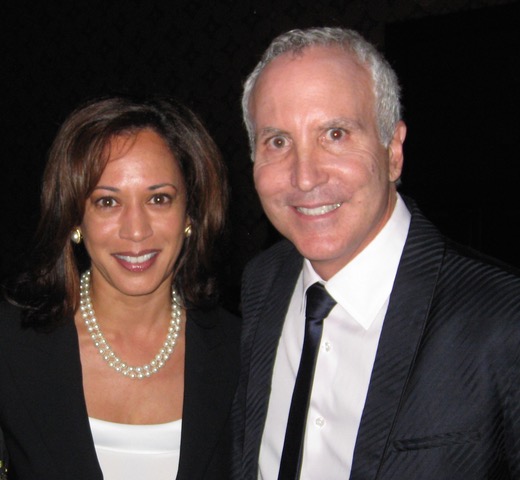
California Attorney General candidate Kamala Harris with Equality California Executive Director Geoff Kors at an EQCA event (Photo by Karen Ocamb)
Harris will have a strong LGBT cheering section glued to TVs across California, including longtime friend Mark Leno, the first openly gay man elected to the State Senate who brought Harris to her first Human Rights Campaign gala in 1999 and Palm Springs City Councilmember Geoff Kors who, as executive director of Equality California, first introduced Harris to the broader LGBT community when she was the San Francisco DA running for attorney general.
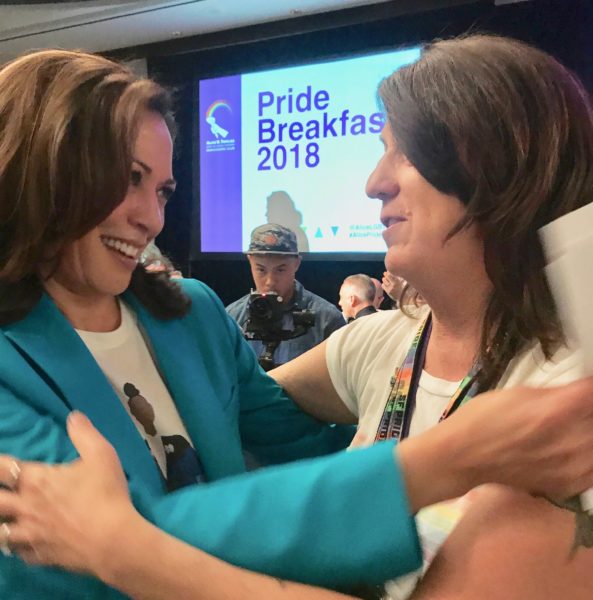
Sen. Kamala Harris and Kate Kendell, Campaign Manager for
Take Back the Court, at a Pride event (Photo courtesy Kendell)
Kors and Kate Kendell, former executive director of the National Center for Lesbian Rights, also worked closely with Harris when San Francisco Mayor Gavin Newsom decided to issue marriage licenses to same sex couples in 2004 and Harris was recruited to officiate at City Hall. They teamed up again to fight the anti-gay marriage Prop 8, which her 2010 opponent, Republican LA DA Steve Cooley supported.
Kris Perry, former plaintiff in the federal lawsuit against Prop 8, whose wedding to Sandy Stier Harris officiated when Prop 8 was defeated, tells the Los Angeles Blade she supports Harris “100%.” Perry’s son Spencer works on Harris’ presidential campaign.

Attorney General Harris officiating at the wedding of Kris Perry and Sandy Stier, with Elliot Perry looking on. (Photo courtesy Perry)
The documentary “The Case Against 8” shows the wedding and the moments before when fellow Prop 8 plaintiffs Paul Katami and Jeff Zarrillo in LA are being told to “step aside” to let straight couples get their licenses since the Los Angeles County Registrar/Clerk’s had not yet received official word from the state to go ahead after the Supreme Court decision. The couple is stunned but their legal team gets Harris on the phone—she’s celebrating with Perry & Stier, Chad Griffin, Cleve Jones and others in San Francisco—and Harris directs Clerk Dean Logan to start the marriages now. She tells him to “enjoy it.” Logan says he will—he’s a strong LGBT ally.
Interestingly, Harris confirms that she intentionally uses the couple in her book as an example of finding the commonality in people. In the chapter “Wedding Bells,” she talks about Prop 8 and officiating at their wedding—and then, in the same chapter, she talks about meeting, falling in love with and marrying white California attorney Doug Emhoff, who brings to the interracial marriage two adult step-children. Thought there is no blaring neon light signaling her intention, Harris uses her own personal story and a public exercise of her office to illustrate that a straight inter-racial couple and a lesbian couple, both with children folded into a blended family, have the experience of love in common.
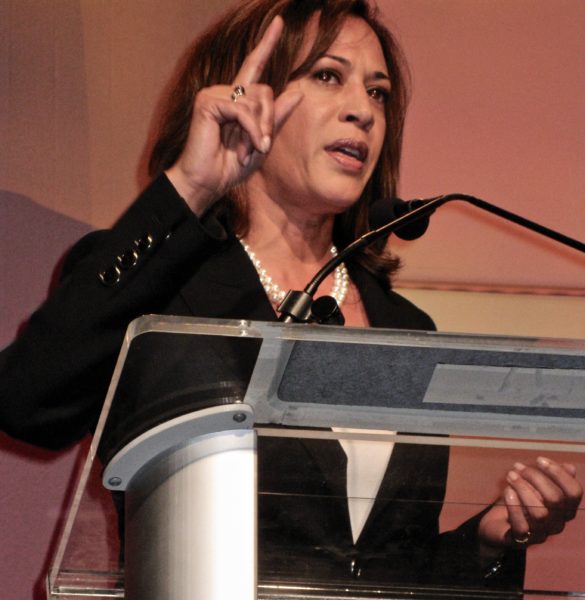
Attorney General Harris at Equality California event (Photo by Karen Ocamb)
Indeed, while Harris works at finding commonality and building coalitions, she is herself the walking positive personification of intersectionality and an example of why identity politics still serve to combat invisibility and under-representation.
Her brilliant parents immigrated from Jamaica and India. She fought hard to become the first female, the first black and the first Asian-American district attorney in San Francisco. Then she fought to become California’s first female, black, and Asian-American attorney general. She then the second black woman in U.S. history to win a Senate seat.
“I grew up exposed to many cultures, and it certainly did teach me from birth about the fact that people have so much more in common than what separates them,” Harris tells the Los Angeles Blade. “I didn’t have to learn it from reading about it. I didn’t know the word ‘intersectionality’ but I’ve always known the commonality between people. A mother’s love for her child, a parent’s desire for their family to be healthy and safe. These are universal truths, regardless of the last name and how you spell it, or what your grandmother’s language is, or the God you pray to. That’s how I’ve always lived my life, which is knowing the commonality between people.”
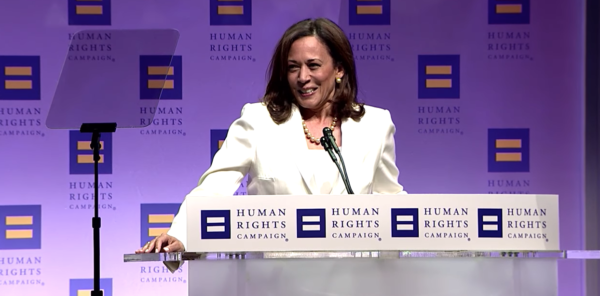
It was a point she made in her Oct. 31, 2017 keynote HRC address in Washington DC.:
“I believe this is a moment when our country is witnessing an assault on our deepest values and ideals. Where people don’t trust our government, its institutions, or leaders.
So to restore that trust, HRC I believe we must speak truth.
Even when it makes people uncomfortable.
Even when others are silent.
And as the poet Audre Lorde reminds us, “there are so many silences to be broken.”
So let’s speak truth. From Charlotte to Charlottesville, we have been reminded racism in this country is real.
Sexism, anti-Semitism are real in this country.
Homophobia and transphobia are real in this country.
And we must speak that truth, so we can deal with it…..
And we need to speak another truth. That despite the forces of hate and division that are trying to tear us apart, Americans have so much more in common than what separates us. That is a truth.
I remember, for example, many years ago I was sent to go speak in the Castro to a group of young gay men. I was there – apparently you were too – I was there campaigning against a ballot measure that would have required young women to notify their parents before getting an abortion.
And so I was going to speak in this home in the Castro with a group of twenty, thirty year old men, and I remember scratching my head, thinking “Ok now what am I going to say to this group that for the most part has not had to deal with an unintended pregnancy?”
So I said to them, “I guess you guys are wondering what you could possibly have in common with a 16-year-old pregnant girl.” And as you can imagine, everyone laughed.
And then I asked them, “Well, when you were 16, did you want to speak with your parents about your sexuality?” And the room went silent.
Because they knew we have so much more in common than what separates us. And I think it’s what Bayard Rustin meant when he said, “You have to join every movement for the freedom of people.”
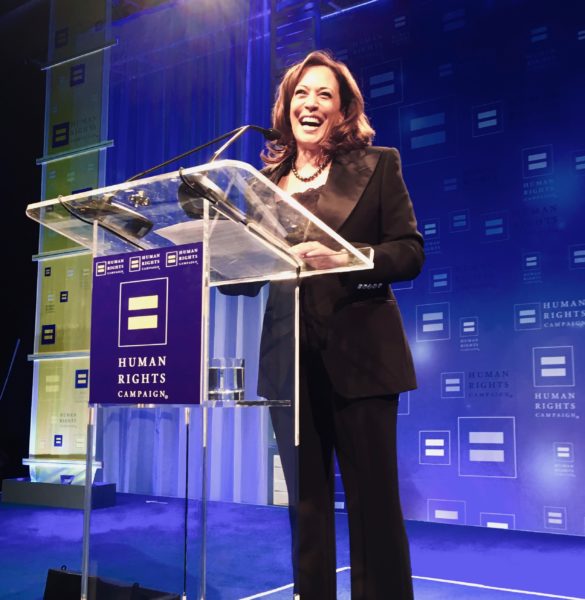
Sen. Kamala Harris at 2019 HRC/LA gala (Photo by Karen Ocamb)
Two years later, at the HRC/LA gala last April, Harris again underscored how the country is at an inflection point and each citizen has a responsibility to respond.
“These last two years and some months have certainly caused a lot of us to start talking to an inanimate object called a television and to shout at that thing,” Harris said, prompting agreeing chuckles from the crowd. “It has caused a lot of us to sign up for individual or group therapy, it has caused a lot of us to feel a lot of despair and depression and anxiety and fear. And I say, ‘Don’t let the bad guys win!’”
Harris also referenced poet Emma Lazarus’ famous quote “Until we are all free, we are none of us free.”
“Let’s pass the Equality Act in the U.S,” she said. “Until all of us are equal, none of us are equal.”
That these are not just “freedom” talking points pulled out for an LGBT gala is illustrated by a funny vignette in her memoir. Harris and her younger sister Maya were raised by her civil rights activist mother Shyamala. At one rally, when Harris was still in a stroller, she starting acting out, being fussy. When her mother asked her what she wanted, toddler Harris said, “Fweedom!”
In 2014, out legal eagle Chris Geidner reported on Harris the “progressive prosecutor” at a Center for American Progress’ Making Progress Policy Conference:
“If there’s a distrust of law enforcement — and, by extension, government — all of the systems break down, at least for certain populations,” she said. “When I charge a case … it’s in the name of the people and the premise there is that a crime against any of us is a crime against all of us. If there are specific communities that are not receiving the full benefit of the protections we created, it’s a problem for all of us.”
Asked about the history of distrust between the black community and law enforcement, Harris said, “It’s all of our responsibilities to acknowledge it and deal with it where it occurs. And it’s not just because it’s the morally right thing to do, I believe it’s in the best interest of public safety for everyone.”
A funny vignette in a lengthy profile of Harris in the May issue of The Atlantic suggests gay people are part of her everyday consciousness, not just called forth when required. It’s a vignette she later talked about on The Daily Show With Trevor Noah.

Screengrab from CNN reporter Maeve Reston’s tweet
Harris and her sister, followed by a slew of journalists, visited Styled by Naida, “a vintage-clothing store run by Naida Rutherford, who grew up in the foster-care system and was homeless before she steadied herself economically by hosting stylish garage sales,” Elizabeth Weil reported.
After picking out a hat and a black belt:
“Harris noticed a brightly colored sequined coat, a chessboard of turquoise, purple, yellow, green, and sky blue. The jacket was just about the furthest fashion choice imaginable from Harris’s standard dark blazer. Still, Rutherford, a good saleswoman, encouraged Harris, a good candidate, to try it on, and Harris did. She looked in the mirror, the horde of journalists to her back. “This really would be perfect for the Pride parade,” she said.
A nice, unguarded human moment. The jacket was way too big, and she’ll almost certainly never wear it anywhere but the parade. But you’d have to be a monster—and a tone-deaf politician—not to want to support Rutherford. Harris bought the coat.”
Kamala (comma-la) Harris was born on Oct. 20, 1964, five years before the Stonewall Rebellion, and never needed an epiphany to discover that LGBT people were OK.
“I grew up in a community and a culture where everyone was accepted for who they were, so there wasn’t a moment where it was like, ‘Okay, now let’s let this person in.’ Everyone was a part of everything. It was about community,” Harris says. “It was about coalition building. It was about equality, inclusion. I mean, I had an uncle who was gay. [But] there was no epiphany” about gay people.
In fact, with the exception of Buttigieg’s very presence, Harris is the only top-tier presidential candidate to constantly reference homophobia and transphobia in her speeches.
But some trans people are still angry over how Harris backed the Department of Corrections in its 2015 denial of gender reassignment surgery for then 51-year-old inmate Michelle-Lael Norsworthy.
The Washington Blade’s Chris Johnson asked Harris about the issue in January at Harris’ first news conference after announcing her 2020 presidential bid.
“I was, as you are rightly pointing out, the attorney general of California for two terms and I had a host of clients that I was obligated to defend and represent and I couldn’t fire my clients, and there are unfortunately situations that occurred where my clients took positions that were contrary to my beliefs,” Harris said.
“And it was an office with a lot of people who would do the work on a daily basis, and do I wish that sometimes they would have personally consulted me before they wrote the things that they wrote?” Harris said. “Yes, I do.”
“But the bottom line is the buck stops with me, and I take full responsibility for what my office did,” Harris said.
Harris confirmed to the Los Angeles Blade that she worked behind the scenes with the California Department of Corrections & Rehabilitation to establish a process enabling transgender inmates to receive transition-related care, including gender reassignment surgery, and she worked on getting Norsworthy paroled.
“I did it quietly, because I actually disagreed with my client initially, when they had the policy, and so I did it behind the scenes,” Harris tells the Los Angeles Blade. “I helped to resolve and change the policy. The issue for me was to make sure the right thing would happen.”
But Harris adds: “Let me just be very clear. I don’t want to take full credit for that, because I don’t deserve full credit for that. I don’t want what I said to be interpreted as that. There were a lot of people involved in that.”
But Harris’ responses have been so cerebral, some feel she doesn’t see the humanity in trans individuals.
“I understand not only their humanity, but I also understand the unfair challenges that they face in a society that still hasn’t come to appreciate their full humanity,” Harris tells the Los Angeles Blade. “And I know the hate that also has been targeted at our transgender friends, and I know that it resulted in lethal proportions. That’s why, when I was the vice president of the National District Attorneys Association, I led the national DAs in a training on the ways that we can get rid of the ‘gay panic defense,’ because I knew it was being used as justification for the killing of many people, including transgender people.”
Transphobia “is something I care deeply about. I have known many people who are transgender, and talked with them and really shared their pain around what their life experience has been like because of the ignorance that still exists about who they are and the challenges they face,” Harris says.
That includes all healthcare concerns.
On Thursday, June 20, Harris introduced the PrEP Access and Coverage Act, legislation to guarantee insurance coverage for PrEP and create a grant program to fund access for uninsured patients.
“PrEP is a critical advancement in the fight against HIV that can finally provide peace of mind to Americans who live in the shadow of the HIV epidemic. But for too many in our country, lack of insurance coverage and exorbitant costs have put PrEP out of reach—and that needs to change. We must truly commit ourselves to HIV prevention by finally requiring every health insurance plan—public and private—to cover PrEP and all of the required tests and follow-up doctors’ visits. We must also provide the resources necessary to help people without insurance access PrEP. Nearly four decades since the beginning of the HIV/AIDS crisis that took so many lives and caused countless others to live in fear, we can and will stop the spread of this disease,” said Harris in a statement.
Harris says that if elected president, she would sign an executive order to protect DREAMers and put them on a path to citizenship. The Los Angeles Blade asked if she would sign an executive order for the Equality Act, the LGBT civil rights bill that would prohibit discrimination against LGBT people in employment, housing and public accommodations.
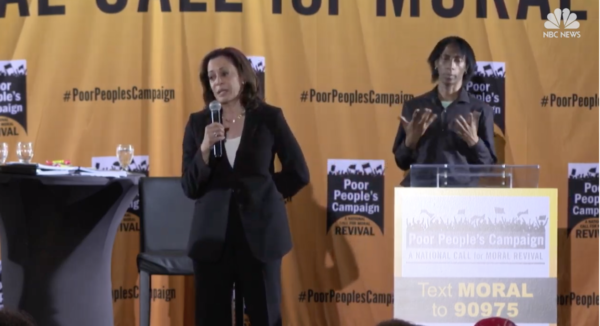
At the recent Poor People’s Campaign forum on poverty, Harris noted her efforts to help LGBT homeless youth in San Francisco. But, other that the Campaign’s leader, Bishop William Barber, LGBT people are being left out of the discussions and debates over the economy, pay equity, and jobs. The last report with research from the Williams Institute, the Center for American Progress and the Movement Advancement Project was in 2015 under President Obama.
The report found that: “Due to discriminatory laws, America’s 5.1 million LGBT women face lower pay, frequent harassment, compromised access to health care, and heightened violence. Anti-LGBT laws, together with inequitable and outdated policies, mean that LGBT women’s economic security is compromised by reduced incomes and added costs ranging from health care to housing.”
“LGBT women face added challenges not solely because of their gender, but also because of who they are and whom they love. Discrimination and stigma, combined with the struggles faced by all women, make LGBT women and their families especially vulnerable,” said Ineke Mushovic, executive director of the Movement Advancement Project.
“Making matters worse, the burden falls most acutely on those who can least afford it: LGBT women raising children, older LGBT women, LGBT women of color, LGBT immigrants, and those LGBT women and families who are already living near or below the poverty line.”
The Equality Act, which has passed in the House, would help counter some of these issues. While Harris did not commit to issuing the legislation as an executive order, she did commit to making it a top priority as president.
“One of my first orders of business would be to get the Equality Act passed,” Harris says. “Listen, I believe in the words and the spirit behind the Constitution of the United States and all of its amendments and those words we spoke in 1776 at the founding of our nation—that we are all equal and should be treated that way. That’s why I fought against Prop 8. I don’t believe that it is reflective of our democracy or the spirit of our founding, that any person would be treated differently under the law.
“So it is for all of those reasons that the Equality Act would be a first order of business for me,” Harris continues, “and to do everything that I can within my power to make sure that we make that point about who we are as a nation. I often look at the words inscribed on that marble at the United States Supreme Court, and it says, ‘Equal Justice Under Law.’ I truly believe that. That is our goal. That is our ideal. That is part of who we are as a nation and we have to fight for that every day.”
Cover photo of Sen. Harris at 2018 Pride parade courtesy Harris’ 2020 presidential campaign.
Obituary
Appreciating literature’s gay genius, Michael Silverblatt
Journalist Karen Ocamb remembers literary guru and host of KCRW’s Bookworm, and his place among LGBTQ legends.
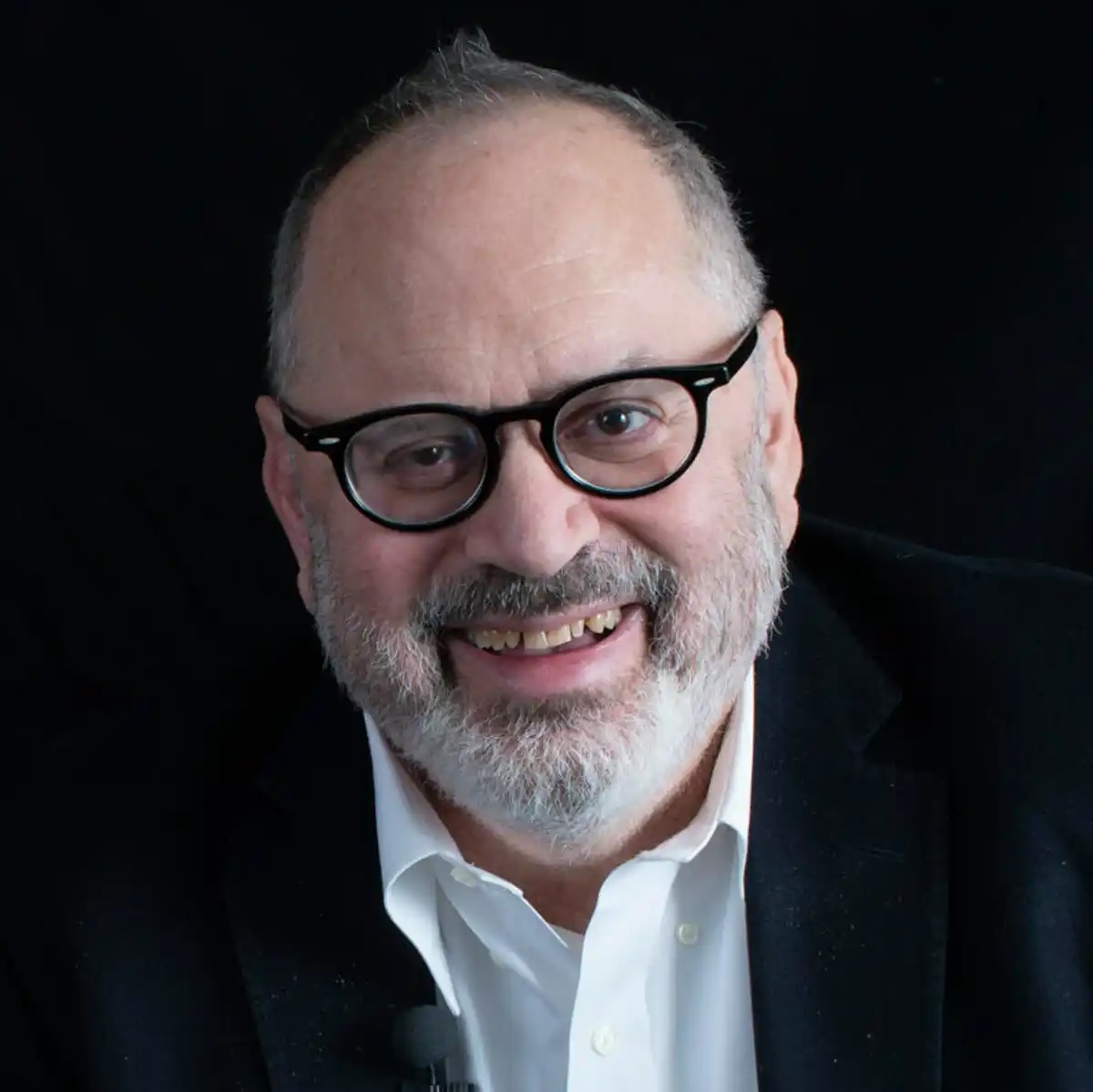
The superlative does not exist to describe Michael Silverblatt’s passion hosting KCRW’s Bookworm, which the New York Times described as a “literary salon of the air.” Michael died from complications of diabetes at his Fairfax district home on Feb. 14, Valentine’s Day. He was 73.
Many, many famous writers and artists have described their appreciation for Michael’s unique, insightful depth of literary knowledge. Norman Mailer called Michael “the best reader in America.” Susan Sontag called him “a national treasure.” Joyce Carol Oates called him “the very Mozart of literary interviewers.”
“Michael was a genius. He could be mesmerizing and always, always, always brilliant,” Alan Howard, Michael’s friend and Bookworm editor for 31 of the show’s 33 years, told the Los Angeles Times. “It’s an extraordinary archive that exists, and I don’t think anyone else has ever created such an archive of intelligent, interesting people being asked about their work.”
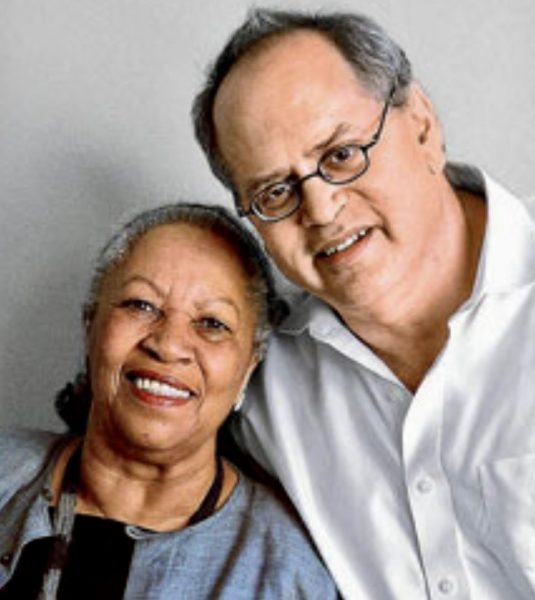
A curious twist of fate landed Michael in what turned out to be his own wonderland, conducting more than 1,600 interviews with brilliant writers and artists such as Joan Didion, Toni Morrison, Susan Sontag, Margaret Atwood, Ann Beattie, Kurt Vonnegut, Salman Rushdie, Gore Vidal, Tom Wolfe, Nobel Prize winner Kazuo Ishiguro, and David Foster Wallace.
Michael was born in Brooklyn, New York, on Aug. 6, 1952, and raised in Queens by parents who were two accountants – children of Russian and Polish immigrants who didn’t quite know what to do with their reclusive, budding gay, Jewish intellect.
“My first crucial book was Alice in Wonderland. My mom used to take me with her to the beauty parlor, and I asked her to get me the big Walt Disney Alice in Wonderland with the colored pictures because it was so pretty and mysterious to me. I remember the Cheshire cat, pink and purple with a heckler’s smile,” Michael told Sarah Fay during an interview at the University of Iowa in 2010. “My mother instead bought me the Lewis Carroll Alice’s Adventures in Wonderland with the black and white Tenniel engravings, and I was very disappointed. She did it not because she had a particular investment in literature but because the Disney was so much more expensive and we were always mindful of our economy.
“And when I finally read it,” he continues, “it took me a good two years—I was absolutely fascinated and perturbed by it, particularly by the section where Alice finds herself in the wood where nothing has a name, and she doesn’t know her own name. The engraving has Alice in the woods with her arms around the neck of a fawn, not strangling the fawn, but embracing it as if for dear life, or as if she doesn’t know if she is a fawn, too. The mystery of reading all of those poems that made less sense if you didn’t know the popular poems they were parodies of made it even stranger. I was absolutely entranced by Alice and Lewis Carroll.”
Through Lewis Carroll’s Symbolic Logic and The Game of Logic, Michael taught himself logic and math. “I developed quite a proficiency for abstract math.”
Intellectual challenges became games when, in junior high, Stephen Sondheim published “Cryptic Crosswords” in New York magazine, and Michael would “enter the words as a knight would move across a chessboard.”
As “[Donald] Barthelme has his Snow White character say in his first novel (1967), I want to hear words I have never heard before. I want the words and sentences to peacock around, to open their plumes,” Michael told Fay. “I have an experience of the book, and it’s as if I have not a flat surface in front of me but rather a beehive around my head. It’s very strange.”

In 1968, after graduating from Bayside High School at age 16, Michael enrolled in SUNY at Buffalo, where authors such as Michel Foucault, John Barth, Donald Barthelme, and J.M. Coetzee were professors. Michael was awkward, shy, and inhibited by a stammer – but he secretly considered the professors friends and spoke with them after class.
During summer vacation, his parents pushed him to be a postal worker with a mail route on the Upper East Side that took him past old bookstores. He subsequently bought the complete works of Charles Dickens while his literary tastes were also expanding to the experimental and avant-garde.
Michael refused to major in business, choosing math as a compromise. But he quickly switched to English, graduating with a BA in 1974. He went for a PhD at Johns Hopkins University but dropped out after a year, paralyzed by writer’s block. “I thought I wanted to be a writer, but that really didn’t turn out to be my gift,” Michael told Kristy Davis for Oprah.com.
After a screenplay he co-wrote received some Hollywood attention, Michael relocated to Los Angeles to pursue his dream of writing scripts and books. But the script wasn’t picked up, and he found himself lost, broke, jobless, and drinking a lot. “At the time,” he told Davis, “I resembled a homeless person who unaccountably had an apartment.”
Michael found a 12 Step program, and his life changed. Friends helped him learn how to take care of himself and found him a job at Freeman & Sutton Public Relations in West Hollywood.
That’s where I met Michael in the mid-80s. Brad Bessey, Michael, and I became the gay troika in that office. I was a fellow 12 Stepper, so Brad and I helped brainiac Michael with living in the real world – like cleaning up crumbs. Showbiz-sharp Brad helped Michael and me with the who’s who in Hollywood. And I learned how to write spin-filled press releases about “causes” like I used to read as a journalist.
“We were odd friends,” Brad remembers about Michael. “Back in the mid-eighties, we met in the glittering churn of celebrity PR. I was young, handsome, brash, and built for the room. Michael, on the other hand, was quieter and a little awkward—as if words lived more comfortably on the page than in the room. I loved his laugh, his intellect, and the way, when I trusted him with my poetry—shared with few—he met it with tenderness: an encouraging question, a precise insight, never once making me feel small. When he landed KCRW’s Bookworm, it felt like a metamorphosis—awkwardness transforming into flight—his brilliance suddenly finding a home, audible at last, lifting literature into the air. And always, that laugh.”
We three broke up in the late 80s: I went to live with Wallis Annenberg in Beverly Hills, intending to write plays; Brad wound up as E!’s Director of Talent & Development where he resurrected Joan Rivers career by putting her on the red carpet; then on to Entertainment Tonight where he encouraged actor Michael Jeter to come out in 1997 as a gay man with HIV/AIDS, and highlighted transgender actor Alexis Arquette.
In 1988, Michael had a famous encounter at dinner in Santa Monica, where he was representing actor Ray Sharkey (Wiseguy). He overheard KCRW’s general manager, Ruth Seymour, talking about Russian poet Osip Mandelstam, a victim of one of Stalin’s purges in the 1930s.

“I had just gotten back from Russia, and we were at this dinner with an actor, a producer, and a director who were talking Hollywood,” Seymour told Lynell George for a 3,596-word LA Times feature on Michael in 1997. “And Michael and I got into this whole discussion about Russian poetry, talking to the exclusion of everyone else. He’s a great raconteur, and so the rest of the world just vanished….So afterward I just turned and asked him: ‘Have you ever thought about doing radio?’”

Soon thereafter, Michael started volunteering as host for Bookworm on KCRW, a public radio station on the campus of Santa Monica College. Five years later, thanks to enthusiastic Lannan Foundation support, he was paid, treated like royalty on college campuses and other venues for the special Lannan Foundation “Readings and Conversations” series, and became syndicated nationally.
“The purpose of the show is to help my listeners look through writers’ eyes,” Michael told The New York Times in 1999.“It’s to show them, whether they’re reading or not, how writers re-enchant the world, how they surround us with the miraculous. That’s what books do to me and what I want my show to do, to remind people how odd and special writers’ minds and imaginations are.”

But Michael also cared about public relations, as he shared with his friend Tosh Berman in this 1987 interview. “For people like me, wearing a sports jacket [for PR work] is like the best rebellion of all,” Michael says. “It’s like wearing a clown suit every single day – and enjoying the formality of it, too. The great joy, as William Burrows pointed out, is to feel completely costumed and to be absolutely anonymous.”
“I care about deeply serious writing in America – dance, art. Why should all sorts of less valuable forms be winning attention in the press and the media when the arts languish in need of budgets and government funds,” he says. “This is very important – that we have a government that supports the arts. But it’s more important that we have a culture that supports the arts.”
However, it needs to be created. “I think it is there but very embryonically,” Michael says. “That’s the kind of thing I’m interested in doing – in helping the arts reach their audience and making that audience aware that, like an addiction to drugs – there are those of us who are art addicts – whose lives are changed by the brilliant people who make new things, new forms, new forms of culture.”

One of Michael’s most famous interviews was with David Foster Wallace in 1996 after the publication of Wallace’s 1078-page ultimate mega-meta novel Infinite Jest. Michael immediately stuns the author by observing that the book was written and structured in fractals. After an awe-struck Wallace agrees and explains, Michael goes deeper.
“[W]e’re entering a world that needs to be made strange before it becomes familiar,” he says. Infinite Jest isn’t difficult “for difficulty’s sake; it seemed like immense difficulty being expended because something important about how difficult it has become to be human needed to be said, and there weren’t other ways to say that.”
Wallace is heard quietly saying, “I feel like I wanna ask you to adopt me.”
Over the years, Michael’s vision becomes clearer. “There are all sorts of other things that you get on radio and television,” he told Oprah.com in 2009, “but I wanted listeners of Bookworm to hear words, ideas, but particularly emotions that don’t get discussed in public, if at all elsewhere. That is to say, for one reason or another, the show is a crusade that’s much larger than the subject of books.”
That includes books by and about LGBTQ+ people. In a 2006 interview, Brokeback Mountain author Annie Proulx shares how Ang Lee’s film Brokeback Mountain reflects her vision that the main romantic characters of Ennis del Mar and Jack Twist are not traditional “cowboys” but poor ranch hands in 1963 rural Wyoming. She’s also annoyed with gay fans who have inundated her with alternative “happy” endings.
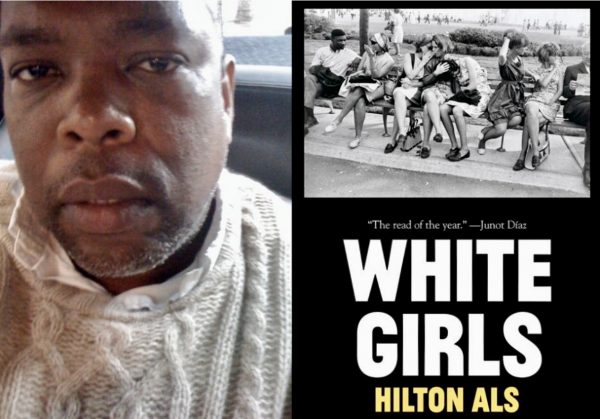
In an introduction to his 2014 interview about Hilton Als’ book, Michael writes: “White Girls (McSweeney’s), his first book in 14 years, is a series of essays that defy easy categorization – in each he takes the risk to say what must be said. Countering books that define ‘blackness’ in the title like Richard Wright’s Black Boy, Als, a black gay male, is interested in making words opaque. He chronicles longing, loss of loved ones, and the establishment of his voice in the New York of the late ’80s and ’90s. He looks back to Richard Pryor and forward to Eminem. His ‘white girls’ are neither necessarily girls nor white. They are Diana Vreeland, Michael Jackson, Truman Capote, and Louise Little. He posits: what if we existed in a world that was not categorizable?’ Wouldn’t we be left with something more humane and complicated?”
Michael is keenly aware of the importance of identity.
“A book about English children in a castle,” he tells the LA Times, “that was the training, when I was young, to imagine a world that didn’t include me. Books and television are our cultural mirrors… and when you look into the mirror, and you don’t see your face, this is possibly a nightmare situation–the act of looking but not finding yourself, or looking and finding yourself where you don’t belong. So until I found books that had a Michael in them, part of me didn’t fully yet exist.”
Finding an image was also startling. “When I learned that there were [such] books–Bernard Malamud, Grace Paley, Henry Roth, that generation of Jewish writers–my first impulse was to resist. ‘This isn’t the castle!’ I was frightened. It was the language I heard around the house. If you’re any kind of minority, to open a book and hear the people around you, your aunts and uncles talking to you . . . that that language should be in a book? I mean, this is an enormous day!”

In 2005, Michael and his team produced a 10-part series entitled Escaping the Cage: Identity, Multiculturalism and Writing, playing off Angelou’s autobiography, I Know Why the Caged Bird Sings about the human desire to make one’s voice heard even when shackled. Michael “inverted the concept: Writers of defined backgrounds — such as ethnicity, gender or sexual orientation — can become imprisoned by it, he believes, an effect of everything from publishers’ marketing strategies to the editing decisions of anthologists,” The Times reported.
“The cage became the cage of ethnicity,” Silverblatt said. “People were being asked to see literature as entirely a matter of identity…. People were not being allowed to be writers. They were being turned into spokespeople.”
Part 6 is devoted to Sexuality and Literary Theory: “James McCourt discusses the emergence of ‘queer identity’ and gives an overview of French literary theories and their influence on multiculturalism–while Camille Paglia explains the destructive nature of such theories. Booker Prize winner Alan Hollinghurst, who writes about the gay experience, reveals that he reads very little popular gay literature. Edmund White explains how he has turned away from the aesthetic and has embraced social realism in his desire to document the AIDS crisis.”

Author John Rechy, famous for the 1963 gay classic City of Night, wrote a letter to Michael agreeing with his premise. Quoting from one of his essays, he writes: “There is a counterattack by the `mainstream’ to consider. One of its main tactics to effect that countering is through the creation of `liberated ghettos’. When book-chains assign labeled sections to `Chicano literature,’ `Gay Literature,’ `Women’s Studies,’ they segregate. So do `mainstream’ publishers who aim minority books only at minorities and who promote such works, if at all, with restricted advertising.” Brad Bessey is now the director of Communications and Talent Relations at Project Angel Food, where he used to volunteer in 1989. And after 46 years as a journalist for the LGBTQ+ community, I am now writing a Substack called LGBTQ+ Freedom Fighters.
And Michael – he found loving friends, deep admiration, and captured his dream. “I’m as fantastical a creature as anything in Oz or in Wonderland,” he told the Cornell University English department in 2010. “I like it if people can say, ‘I never met anyone like him,’ and by that they should mean that it wasn’t an unpleasant experience.”
I never met anyone like him.

This tribute to Michael Silverblatt is cross-posted from Karen Ocamb’s Substack LGBTQ+ Freedom Fighters.

The 2026 Los Angeles Blade Best of LGBTQ LA Awards are here! You submitted your nominations—now it’s time to vote for the finalists. Voting is open through March 6, 2026.
Among some of your favorite categories are Best Drag Performer, Local Influencer of the Year, Best Happy Hour, Go-Go of the Year, Activist of the Year, Public Official of the Year, Best Non-Profit, Best Bartender, Best DJ, Best Local Podcast, and so many more!
Winners will be revealed at the Best of LGBTQ LA celebration on Thursday, March 26 at The Abbey. Stay tuned for more party details coming soon!
Vote using the form below or by clicking HERE.
Here are this year’s nominees!
Best Drag Performer
- Cake Moss
- Charles Galin King
- Kyra Jete
- Laylah Amor
- Misty Violet
Best Drag Show
- Bring It To Brunch at Mattie’s
- Brunch Service at The Abbey
- Hamburger Marys West Hollywood
- Las Reinas at Mickys
- Rocc-ettes at Mattie’s
Local Influencer of the Year
- Charles Hernandez (CnoteLA)
- Curly Velasquez
- Justin Martindale
- Lucas Dell
- Rose Montoya
- Victoria Pousada Kreindler
Best LGBTQ Bar
- Gym Bar
- Kiso Los Angeles
- Mattie’s Weho
- Or Bar
- The Abbey
Best Happy Hour
- 33 Taps
- Fiesta Cantina
- Hi-Tops
- Mickys
- Motherlode
- The Abbey
Go-Go of the Year
- Daniel Mooney
- Gabriel Gonzalez
- Jay Nova
- Prince Joshua
- Steven Dehler
- Victoria Shaw
Best Restaurant
- Bottega Louie
- Hamburger Mary’s
- La Boheme
- Pura Vita
- WeHo Bistro
Best Radio or TV Station
- CHANNEL Q
- KTLA
- LatiNation
- Out TV
- REVRY
Best Cannabis Retailer/Lounge
- Artist Tree Lounge
- Elevate
- Green Qween
- Med Men
- The Woods WeHo
Best LGBTQ Owned Business
- Fan Girl Cafe
- Green Qween
- JJLA
- MISTR
- Wildfang
Best LGBTQ Social Group
- Dark Circle Film Society
- Gay Men’s Chorus of Los Angeles
- NLGJA Los Angeles
- Outloud Sports
- Unique Woman’s Coalition
- WeHo Dodgeball
Best House of Worship
- Congregation Kol Ami
- Founders Metropolitan Community Church Los Angeles
- Hollywood Boulevard Episcopal
- Hollywood United Methodist
- InVision Church Los Angeles
Activist of the Year
- Cory Allen
- Joshua Marin-Mora
- Liliana Perez
- Maebe A. Girl
- Rose Montoya
Public Official of the Year
- CA State Treasurer Fiona Ma
- Chelsea Byers
- John Erickson
- Lindsey Horvath
- Maebe A. Girl
Best Local Pro Sports Team
- Angel City FC
- LA Chargers
- LA Dodgers
- LA Lakers
- LA Rams
- LA Sparks
- Los Angeles FC
Local Ally of the Year
- Abbe Land
- Jessica Steinman
- Kevin De Nicolo
- Lindsey Horvath
- Senator Lena Gonzalez
Best Doctor/Medical Provider
- AIDS Healthcare Foundation
- Better U
- Dr. Eric Chaghouri
- LA LGBT Center
- St. John’s Wellness
- UCLA CARE Center
Most LGBTQ-Friendly Workplace
- AIDS Healthcare Foundation
- City of West Hollywood
- JJLA
- Los Angeles LGBT Center
- Revry
Non-Profit of the Year
- AJ Socal
- Equality California
- Los Angeles LGBT Center
- OutAthletes
- Project Angel Food
- Trans Lifeline
Best Local Actor
- Annie Reznik
- Jason Caceres
- Michael Scott Montgomery
- Nhut Le
- Shaan Dasani
- Trevor Dow
Best Local Theatre
- Celebration Theatre
- Center Theatre Group
- Geffen Playhouse
- International City Theatre
- LA Opera
- Pasadena Playhouse
Local Musical Artist of the Year
- Prince Joshua
- Robert Rene
- Ross Alan
- San Cha
- Tom Goss
Best LGBTQ Event
- Dinah Shore
- GLAAD Awards
- LA Opera Pride Night
- MISTR’s National PrEP Day
- Outloud Music Festival at Weho Pride
- Pride Night by Hyperion LA
Best Regional Pride
- DTLA Proud
- Hermosa Beach
- Long Beach Pride
- Palm Springs Pride
- WeHo Pride
Best Promoter of the Year
- Andres Rigal
- Ash Rodriguez
- Beau Byron
- Joshua Flores
- Paul Nicholls
LGBTQ Professional of the Year
- Cory Allen
- Erik Braverman
- Kathleen Rawson
- Liliana Perez
- Michael Ferrera
- Tristan Schukraft
Best Bartender
- Alex Satoshi DiDio
- Danny Hernandez
- Manny De Cielo
- Matt Stratman
- Michael Susi
- Michael Vega
Best DJ
- Boy Apocalypse
- DJ Les Ortiz
- DJ SRO
- Lord Izac
- Simon Harrison
Best Local LGBTQ Podcast
- BabyGay
- No Matter What Club
- No Matter What Recovery
- On The Rocks
- Sloppy Seconds Podcast
- Very Delta
Best Salon/Spa
- Bautis LA
- Folklore Salon & Barber
- Project Q
- Shorty’s Barber Shop
- The Massage Company WEHO
Best Music Venue
- The Disney Concert Hall
- The Hollywood Bowl
- The Roxy Theatre
- The Troubadour
- The Wiltern
Best Fitness/Workout Spot
- Barry’s WEHO
- Equinox on Sunset
- Gold’s Gym
- John Reed Fitness
- LA Fitness, Hollywood
Best Hotel
- Andaz
- Edition Hotel
- Hotel Ziggy
- Kimpton La Peer Hotel
- SoHo House
Books
New book profiles LGBTQ+ Ukrainians, documents war experiences
Tuesday marks four years since Russia attacked Ukraine

Journalist J. Lester Feder’s new book profiles LGBTQ+ Ukrainians and their experiences during Russia’s war against their country.
Feder for “The Queer Face of War: Portraits and Stories from Ukraine” interviewed and photographed LGBTQ+ Ukrainians in Kyiv, the country’s capital, and in other cities. They include Olena Hloba, the co-founder of Tergo, a support group for parents and friends of LGBTQ+ Ukrainians, who fled her home in the Kyiv suburb of Bucha shortly after Russia launched its war on Feb. 24, 2022.
Russian soldiers killed civilians as they withdrew from Bucha. Videos and photographs that emerged from the Kyiv suburb showed dead bodies with their hands tied behind their back and other signs of torture.

Olena Shevchenko, chair of Insight, a Ukrainian LGBTQ+ rights group, wrote the book’s forward.

The book also profiles Viktor Pylypenko, a gay man who the Ukrainian military assigned to the 72nd Mechanized Black Cossack Brigade after the war began. Feder writes Pylypenko’s unit “was deployed to some of the fiercest and most important battles of the war.”
“The brigade was pivotal to beating Russian forces back from Kyiv in their initial attempt to take the capital, helping them liberate territory near Kharkiv and defending the front lines in Donbas,” wrote Feder.
Pylypenko spent two years fighting “on Ukraine’s most dangerous battlefields, serving primarily as a medic.”
“At times he felt he was living in a horror movie, watching tank shells tear his fellow soldiers apart before his eyes,” wrote Feder. “He held many men as they took their final breaths. Of the roughly one hundred who entered the unit with him, only six remained when he was discharged in 2024. He didn’t leave by choice: he went home to take care of his father, who had suffered a stroke.”
Feder notes one of Pylypenko’s former commanders attacked him online when he came out. Pylypenko said another commander defended him.
Feder also profiled Diana and Oleksii Polukhin, two residents of Kherson, a port city in southern Ukraine that is near the mouth of the Dnieper River.
Ukrainian forces regained control of Kherson in November 2022, nine months after Russia occupied it.
Diana, a cigarette vender, and Polukhin told Feder that Russian forces demanded they disclose the names of other LGBTQ+ Ukrainians in Kherson. Russian forces also tortured Diana and Polukhin while in their custody.
Polukhim is the first LGBTQ+ victim of Russian persecution to report their case to Ukrainian prosecutors.

Feder, who is of Ukrainian descent, first visited Ukraine in 2013 when he wrote for BuzzFeed.
He was Outright International’s Senior Fellow for Emergency Research from 2021-2023. Feder last traveled to Ukraine in December 2024.
Feder spoke about his book at Politics and Prose at the Wharf in Southwest D.C. on Feb. 6. The Los Angeles Blade spoke with Feder on Feb. 20.
Feder told the Blade he began to work on the book when he was at Outright International and working with humanitarian groups on how to better serve LGBTQ+ Ukrainians. Feder said military service requirements, a lack of access to hormone therapy and documents that accurately reflect a person’s gender identity and LGBTQ+-friendly shelters are among the myriad challenges that LGBTQ+ Ukrainians have faced since the war began.
“All of these were components of a queer experience of war that was not well documented, and we had never seen in one place, especially with photos,” he told the Blade. “I felt really called to do that, not only because of what was happening in Ukraine, but also as a way to bring to the surface issues that we’d had seen in Iraq and Syria and Afghanistan.”

Feder also spoke with the Blade about the war’s geopolitical implications.
Russian President Vladimir Putin in 2013 signed a law that bans the “promotion of homosexuality” to minors.
The 2014 Winter Olympics took place in Sochi, a Russian resort city on the Black Sea. Russia annexed Crimea from Ukraine a few weeks after the games ended.
Russia’s anti-LGBTQ+ crackdown has continued over the last decade.
The Russian Supreme Court in 2023 ruled the “international LGBT movement” is an extremist organization and banned it. The Russian Justice Ministry last month designated ILGA World, a global LGBTQ+ and intersex rights group, as an “undesirable” organization.
Ukraine, meanwhile, has sought to align itself with Europe.
Ukrainian President Volodymyr Zelenskyy after a 2021 meeting with then-President Joe Biden at the White House said his country would continue to fight discrimination based on sexual orientation and gender identity. (Zelenskyy’s relationship with the U.S. has grown more tense since the Trump-Vance administration took office.) Zelenskyy in 2022 publicly backed civil partnerships for same-sex couples.
Then-Ukrainian Ambassador to the U.S. Oksana Markarova in 2023 applauded Kyiv Pride and other LGBTQ+ and intersex rights groups in her country when she spoke at a photo exhibit at Ukraine House in D.C. that highlighted LGBTQ+ and intersex soldiers. Then-Kyiv Pride Executive Director Lenny Emson, who Feder profiles in his book, was among those who attended the event.
“Thank you for everything you do in Kyiv, and thank you for everything that you do in order to fight the discrimination that still is somewhere in Ukraine,” said Markarova. “Not everything is perfect yet, but you know, I think we are moving in the right direction. And we together will not only fight the external enemy, but also will see equality.”
Feder in response to the Blade’s question about why he decided to write his book said he “didn’t feel” the “significance of Russia’s war against Ukraine” for LGBTQ+ people around the world “was fully understood.”
“This was an opportunity to tell that big story,” he said.
“The crackdown on LGBT rights inside Russia was essentially a laboratory for a strategy of attacking democratic values by attacking queer rights and it was one as Ukraine was getting closet to Europe back in 2013, 2014,” he added. “It was a strategy they were using as part of their foreign policy, and it was one they were using not only in Ukraine over the past decade, but around the world.”
Feder said Republicans are using “that same strategy to attack queer people, to attack democracy itself.”
“I felt like it was important that Americans understand that history,” he said.
California
Experts discuss pathways forward as anti-trans violence continues to rise
On Thursday, Feb. 19, the Williams Institute invited a panel of local experts to discuss the rise in anti-trans hate crimes, and ways communities can seek refuge and support.

During a recent webinar hosted by the Williams Institute, a local LGBTQ+ policy think tank, several policy experts, law scholars, and advocates gathered online to discuss violence against transgender people in California as well as potential solutions to navigate the year ahead.
Here are important updates gathered from the session. These expand on an earlier Blade article about the increase in reported hate crimes and incidents against trans people since 2013.
What we’re familiar with: trans people face higher rates of victimization and violence
llan H. Meyer, the Williams Distinguished Senior Scholar of Public Policy at the Williams Institute, utilized data collected by the 2022-2023 National Crime Victimization Survey (NCVS) and the 2022 U.S. Transgender Survey (USTS) to re-solidify the lived experiences of trans Angelenos and Californians.
The reality is: transgender, gender expansive, and intersex (TGI) communities face much higher rates of violence compared to cis people who are not queer-identifying.
Out of the 9,146 Californian respondents who participated in the national USTS, 19% of those surveyed reported that they received threats of violence. 38% reported facing verbal harassment, and 42% experienced online harassment. Overall, nearly 60% of the TGI people surveyed experienced some form of violence, threatening behavior, or harassment.
And for Black and brown trans women, whose experiences of transphobia may also coincide with misogynoir, racism, and anti-immigration rhetoric, they are at an even greater risk when it comes to experiencing violence and harassment.
Why is there an increase in violence against trans people?
When the webinar’s moderator, Senior Scholar of Public Policy Ayden Scheim, posed this question, Meyer pointed to the political “scapegoating” of trans people in the U.S. Under the current administration, there is a proliferation and mobilization of anti-LGBTQ+ hate that is especially rooted in anti-trans bias.
The higher numbers in recent data can also be explained by increased training for police when it comes to investigating and reporting anti-trans hate crimes and incidents. This could also be because more people are willing to report the violence they face.
Historically, though, TGI people report higher rates of distrust when it comes to seeking support from the police, so they often underreport the violence they experience. While researchers are working hard to collect a more “complete record” and a full portrait of anti-trans hate and violence, there are factors that can limit this work.
“Not everybody reports, not everybody who reports is assessed to actually be a hate crime, and not everybody who is assessed to be an actual hate crime is actually reported upward so that it gets into the data,” Meyer explained, detailing the difficulties researchers can face when trying to piece together a more “complete record” and full portrait of anti-trans hate and violence.
There is a “gap between legal protection and lived safety.”
Much of the distrust trans people experience when it comes to police and officials is a product of systems that have proven to be hostile towards trans people. “I feel like that tells us something that’s really important. Violence is not some random act…It is a pattern. It is structural. It interacts with social perceptions and economic vulnerability,” said Pamuela Halliwell, the Director of Behavioral Health Services at the San Diego LGBT Community Center.
Halliwell described her work as existing at the crossroads between behavioral health, community practice, and research, allowing her intimate insight into the tedious, chronic “hypervigilance” many trans people begin to embody as they face increased fear and stress from the threat of violence.
“It looks like people are being removed from their homes. It looks like fear, shame,” Halliwell described. “It looks like discrimination that feels overwhelming and contributes to a host of other mental health symptoms that become overwhelming and damaging. It looks like housing instability. It looks like communities are carrying communicative stress.”
While acknowledging that California has some of the strongest legal frameworks for trans people, Halliwell explained that there is a gap between stronger protections and the still prominent and tangible violence trans people face. She pointed towards a need for accessible survivor-centered reporting systems, making sure people know that these resources are available and ensuring that data collection and analysis moving forward really centers people across all gender identities.
How do we address our “structural vulnerability” and lean into different avenues of care?
Alec Watts, Assistant Deputy Director of Research and Policy at the California Civil Rights Department (CRD), explained that the department conducts extensive outreach to make sure communities and organizations are empowered with inclusive education. Part of this includes attending events as well as hosting trainings to educate people about civil rights protections, human trafficking, housing, and hate violence.
There are also direct ways members of the public can make their voice heard.
File a complaint
Watts explained that people are encouraged to file a complaint with the CRD directly if they believe their rights were violated. The department is in charge of investigating thousands of these complaints, and can provide mediation and, potentially, help file lawsuits in court on behalf of victims.
Consult in the CRD’s Community Conflict Resolution Unit
These are free, confidential resolution services intended to help community members when people are experiencing fear, conflict, or tension. Members of this unit can help facilitate discussion after an incident occurs, provide educational materials, and can assist schools in mediating tension between students, adults, or both.
Seek anonymous support through the California vs Hate hotline
The CRD operates the non-emergency reporting hotline for anyone in the state who has experienced or witnessed a hate crime or incident. But Watts stresses that this is more than just a reporting hotline — once you make a report, you are connected with a trauma-informed care coordinator who can connect you with legal, financial, mental health, or mediation resources. Services are free and available, regardless of gender, sexual orientation, race, or immigration status. Reports can be made at the website or on the phone, at 8338-NO-HATE.
“Our psyche cannot function in survival mode forever,” Halliwell said, pointing to a sustained fear that trans people navigate the world with. As severe and real as these fears are, Halliwell also clarified that TGI communities are not solely defined by harm. “The data [also] reflects a community that continues to show up, build networks, create chosen families, and demand better systems…It also highlights where intervention is possible. Structural vulnerability can be addressed, prevention is possible, and community care is real and expanding.”
Kristie Song is a California Local News Fellow placed with the Los Angeles Blade. The California Local News Fellowship is a state-funded initiative to support and strengthen local news reporting. Learn more about it at fellowships.journalism.berkeley.edu/cafellows.
Mexico
US Embassy in Mexico issues shelter in place order for Puerto Vallarta
Mexican soldiers killed powerful cartel leader on Sunday

Editor’s note: This article has been updated.
The U.S. Embassy in Mexico on Sunday urged Americans in the resort city of Puerto Vallarta to shelter in place after Mexican authorities killed a powerful cartel leader.
The Washington Post reported Mexican soldiers on Sunday killed Nemesio Rubén Oseguera Cervantes, the head of the Jalisco New Generation Cartel known as “El Mencho,” in Tapalpa, a town south of Guadalajara, the capital of Mexico’s Jalisco state.
Puerto Vallarta is in Jalisco, but is roughly five hours away from Tapalpa.
Local media reports indicate cartel members in response to Oseguera’s killing have set fire to cars and buses in Puerto Vallarta and elsewhere in Jalisco and in other cities across Mexico. The U.S. Embassy’s shelter in place directive also includes Baja California and Quintana Roo states and parts of Guanajuato, Guerrero, Michoacán, Oaxaca, Nuevo León, and Tamaulipas states.
The Mexican border cities of Tijuana and Tecate are in Baja California. The resort cities of Cancún, Playa del Carmen, Tulum, and Cozumel are located in Quintana Roo in the Yucatán Peninsula.
Security Alert – Update: Ongoing Security Operations – U.S. Mission Mexico (February 22, 2026)
Locations: Widespread, including Jalisco State (including Puerto Vallarta, Chapala, and Guadalajara), Baja California State (including Tijuana, Tecate, and Ensenada), Quintana Roo… pic.twitter.com/vwxfOSF6iJ
— Embajada de EE.UU. en México (@USEmbassyMEX) February 22, 2026
“While no airports have been closed, roadblocks have impacted airline operations, with some domestic and international flights cancelled in both Guadalajara and Puerto Vallarta,” reads the advisory. “All taxis and ride shares are suspended in Puerto Vallarta. Some businesses have suspended operations.”
Mantamar Beach Club in Puerto Vallarta’s Zona Romántica, an area in which several gay bars, hotels, and nightclubs are located, is among the businesses that closed on Sunday.
“Due to circumstances beyond our control and road blockages currently affecting the city of Puerto Vallarta, Mantamar Beach Club will remain closed today,” said Mantamar Beach Club on its Facebook page. “This decision has been made in order to prioritize the safety and mobility of our guests, staff, and visitors.”
Giovanni Rocco, a member of the board of directors of the Capital Pride Alliance the group that organizes D.C.’s Pride events, and his partner were in their Airbnb near Zona Romántica at around 10:30 a.m. local time (8:30 a.m. PT) when a friend texted them and asked if they were “okay.” They went up to the roof of their building and saw “fires all across the city.”
“The day’s been pretty wild,” Rocco told the Washington Blade during a FaceTime interview that took place shortly after 7 p.m. local time (5 p.m. PT.) “[We] did not expect to wake up to fires and explosions and gunfire across the city.”
Rocco said he and his partner saw fires from cars that had been set ablaze from their building. Rocco said at one point he saw one of the “big pharmacies here that was set on fire,” but he was uncertain whether someone deliberately set it on fire or whether a car in flames did.
Here’s a look at Puerto Vallarta today. We woke up to find smoke rising from different parts of Zona Romántica. As the afternoon went on, we started to hear more explosions and gunfire. About an hour and a half ago, a Navy helicopter circled the area for a few minutes. pic.twitter.com/T9vwlzdnq3
— Giovanni Rocco (@GRoccooo) February 23, 2026
“We’ve been in our building the entire day — entire in our unit or up on the rooftop to check things out, but we’ve been following that local and State Department guidance and sheltering in place,” Rocco told the Blade.
He said it was “a beautiful week, wonderful weather, sunny. It’s been in the 70s all week. It’s just perfect weather.” Rocco told the Blade that he and his partner on Saturday had dinner on the beach before they went to a couple of bars.
“Everything was fine and normal and great,” he said. “To wake up to this reality, it (definitely) shook (us) up a bit.”
Rocco and his partner had been scheduled to fly back to D.C. on Monday, but their fight was cancelled. The embassy on Tuesday lifted its shelter in place order.
“Public transportation and businesses continue to return to normal operations following a law enforcement operation that took place on Feb. 22,” said the embassy on X. “U.S. citizens are no longer urged to shelter in place.”
National
LGBTQ+ activists mourn the Rev. Jesse Jackson
Prominent civil rights leader died on Tuesday at 84

LGBTQ+ rights advocates have joined the nation’s civil rights leaders in reflecting on the life and work of the Rev. Jesse Jackson, the famed U.S. civil rights leader whose family announced passed away on Feb. 17 at the age of 84.
Known as a follower and associate of African American civil rights leader Dr. Martin Luther King Jr., Jackson emerged in the 1960s as a leading civil rights advocate for the Black community and other minorities for decades throughout the U.S., including in Washington.
In a less known aspect of Jackson’s involvement in politics, following his campaigns for U.S. president in 1984 and 1988, Jackson won election in 1990 as the District of Columbia’s shadow senator, a ceremonial position created to lobby Congress for D.C. statehood.
Jackson, who at that time had a home in D.C., received strong support from D.C. voters, including LGBTQ+ voters who became aware of Jackson’s support for LGBTQ+ issues. He served just one six-year term as the city’s shadow senator before choosing not to run again.
An early supporter of marriage equality, Jackson was among the prominent speakers at the 1987 National March on Washington for Lesbian and Gay Rights. Jackson joined other speakers at a rally on the grounds of the U.S. Capitol.
During his run for president in 1988 the D.C. Gertrude Stein Democratic Club, an LGBTQ+ group that has since been renamed the Capital Stonewall Democrats, endorsed Jackson for president ahead of the city’s Democratic presidential primary.
“The fight for justice requires courage, hope, and a relentlessness that will not be denied. Rev. Jesse Jackson embodied that fight every day,” said Kelley Robinson, president of the Human Rights Campaign, the nation’s largest LGBTQ+ advocacy organization.
“From disrupting political systems and building people power to helping this country imagine a freer future for all of us, Rev. Jackson was a force,” Robinson said in a statement. “His historic presidential campaigns paved the way for generations of Black leaders to imagine ourselves in rooms we were once told were closed to us.”
Robinson added, “Reverand Jackson also stood up when it mattered; when it wasn’t easy and when it wasn’t popular. His support for marriage equality and for LGBTQ+ people affirmed a simple, powerful truth: our liberation is bound together.”
She also pointed to Jackson’s support for efforts to repeal California’s Proposition 8, a 2008 referendum passed by voters to ban same-sex marriage in the state.
“Marriage is based on love and commitment, not on sexual orientation. I support the right for any person to marry the person of their choosing,” Robinson quoted Jackson as saying in support of efforts that succeeded in overturning the California marriage ban.
The national organization PFLAG, which represents parents, friends, and allies of the LGBTQ+ community, released a statement from its president, Brian K. Bond, citing Jackson’s longstanding support for the LGBTQ+ community.
“Today, as we learn of the passing of Rev. Jesse Jackson, we mourn the loss of a giant among us,” Bond said in the statement. “When many refused to acknowledge the existence and struggles of LGBTQ+ people, Rev. Jackson saw us, affirmed us, and demanded equality inclusively,” Bond said. “In his address to the Democratic National Convention in 1984, Rev. Jackson named us specifically as part of the fabric of the American Quilt,” Bond says in his statement.
The statement adds, “He has shown up for and marched with the LGBTQ+ movement through the AIDS crisis, marriage equality, and ever after. Rev. Jackson’s leadership and allyship for LGBTQ+ people will be felt profoundly by his PFLAG family. We will continue to honor his legacy as we continue to strive to achieve justice and equality for all.”
D.C. Mayor Muriel Bowser, citing Jackson’s role as a D.C. shadow senator, said for many in the country, Jackson “was the first person they heard make the case for D.C. statehood. The first person they heard say: it’s the right thing to do.”
Bowser added, “In 1988, he said that we were at a crossroads, and he posed this question: Shall we expand, be inclusive, find unity and power; or suffer division and impotence? It is a question as relevant today as when he asked it,” the mayor said, “And in Rev. Jackson’s name and memory, we must continue fighting for the answer we know our nation deserves.”
D.C. Congressional Delegate Eleanor Holmes Norton (D) said she was honored to have worked with Jackson during his tenure as D.C. shadow senator and throughout his years as a civil rights advocate.
“From the front lines of the civil rights movement to national campaigns that expanded the political imagination of this country, Jesse Jackson lifted up the voices of those too often unheard,” Norton said in a statement. “He turned protest into progress and transformed moral conviction into political action”
According to Norton, “His work-built bridges across race, class, and geography, helping redefine what inclusive democracy could look like in America.”
Los Angeles
Nikko LaMere’s photo exhibit “JOY!” documents the euphoria of Black queer nightlife
Now available to view at the LA LGBT Center, “JOY!” is a raw preservation of Black queer nightlife, fantasy and self-discovery.

It’s 2018, inside queer dance party Ostbahnhof, and the floor is packed with a sweaty, hypnotic energy as people groove to the sexy, lush soundscapes of techno and deep house. Photographer and visual artist Nikko Lamere rushes to grab their disposable camera, accidentally spilling some of their whiskey ginger on someone, and snaps a couple of shots of their friends: immortalizing their uninhibited joy and movement forever.
Eight years later, these photos LaMere captured across various local queer dance parties comprise their newest and largest photo exhibition yet: “JOY!” Displayed at the Los Angeles LGBT Center, “JOY!” is a raw documentation of Black queer nightlife, fantasy, and euphoria. It includes two of LaMere’s major bodies of work and follows the artist’s queer journey and creative evolution.

The exhibit’s opening on Feb. 13 is one of two events in the Center’s “Highly Favored” programming series that uplifts Black queer liberation every February. The next event comes this Saturday, and is a celebratory dance party akin to the ones documented in LaMere’s photos.
Prior to this exhibit, LaMere was most known for their saturated and stylized editorial work with contemporary music phenoms like Doja Cat, SZA, Latto, Billie Eilish and Kehlani. Propelled at a young age into flashy spaces with modern-day tastemakers and legends, LaMere sought refuge in photography throughout their adolescence. Their fascination with the camera began in elementary school while growing up in Culver City, when their grandmother gifted them a Nickelodeon-themed camera to take photos with.
Their eye and talent were reinforced with praise, and this love for the craft grew from curiosity to solace in high school. Bullied for being gay and femme, LaMere sought refuge at the library, where they first discovered the technicolor, surreal work of visionary photographer David LaChapelle. This became a direct pathway for LaMere’s own career: one that, though successful and fulfilling in its own way, led to a need for change.
For so long, the camera was a means to fulfill someone else’s vision. Now, LaMere began to use it as a tool for connection and raw documentation. In 2018, they didn’t set out to create what is now their “In the Night” photo series; they were simply trying to explore their own queer journey, and preserve the friendships and environments that made them feel comfortable in their own skin.
That vulnerable process of “becoming” is one they hadn’t touched upon in their previous work. For the first time, they couldn’t carefully and methodically create the shot; whatever they snapped was based purely on instinct, a fleeting moment of true and embodied tenderness, ecstasy, and freedom.
“To have this body of work shot all in black-and-white, for it to be so gay and Black — it feels really affirming,” LaMere said. “These are the most raw images and things I could create. There’s no Photoshop. There’s no retouching. It’s literally straight from the camera. It just is. I think part of joy is being able to just be, and that’s what these images are.”

“JOY!” also includes LaMere’s work, “Queer Fantasy,” a collection of 40 black-and-white film portraits and interviews with local queer performers, artists, and everyday people. This newer project grew from the core of “In the Night,” and is another intentional project focused on highlighting the beauty and individuality of queer Angelenos. Each person is asked: “What is your queer fantasy?,” illustrating that queer fantasy is not only a transformative kind of rebirth: it is a process built by radical efforts to cultivate joy, success, and safety in the face of violence and discrimination.
For LaMere, “JOY!” is about this process and the moments of self-discovery found on the dance floor, where you can really feel tethered to the person you’re becoming while “the world is burning around you.” While speaking with LaMere, I am grounded by the words of DJ, artist and organizer Darryl DeAngelo Terrell.
“Here, in this space we as black people [are] forced to find liberation in our own bodies, it’s in us, deeper than melanin, and it is activated by bodily acts,” Terrell writes. “We Move* in ways that others can not fathom to understand. Through these acts, we find the most beautiful yet temporary forms of true freedom; we find joy, peace in these acts.”
“JOY!” is available to the public on Wednesdays and Thursdays from 11 a.m. to 4 p.m. More information about the exhibit and “Highly Favored” can be found here. This Saturday’s queer dance party will also honor special guests Hailie Sahar, a starlet on the revolutionary FX show Pose, as well as filmmaker and ballroom culture documentarian Elegance Bratton.
Kristie Song is a California Local News Fellow placed with the Los Angeles Blade. The California Local News Fellowship is a state-funded initiative to support and strengthen local news reporting. Learn more about it at fellowships.journalism.berkeley.edu/cafellows.
Los Angeles
A new “queer summer camp” cycling event rises from the legacy of AIDS/LifeCycle
The LA LGBT Center will host its first ever “Center Ride Out,” a 3-day community cycling adventure from Los Angeles to San Diego.

On April 24, 500 cyclists will meet at Elysian Park before dawn, stretching and preparing for a 110-mile ride through urban scenery and rolling hills. They will be part of the Los Angeles LGBT Center’s inaugural “Center Ride Out,” a 3-day journey that takes riders through Los Angeles and Temecula, reeling to a stop at the San Diego LGBT Community Center.
The cycling adventure is a rejuvenating, communal queer experience that taps into the importance of shared joy and advocacy in the fight to defend LGBTQ+ rights. Its roots are sacred for many queer elders: Center Ride Out rises from the legacy of the cherished AIDS/Life Cycle (ALC), a seven-day cycling adventure from San Francisco to L.A. that formed in 1994 and ended with its last ride in 2025.
In its 31-year run, ALC riders raised over $300 million for HIV and AIDS resources, services, and awareness. This year, Center Ride Out provides a new, exciting extension of this important event, allowing cyclers to raise funds in support of the LA LGBT Center, The San Diego LGBT Community Center, and the LGBTQ Community Center of the Desert.
This support is crucial as LGBTQ+ organizations face a new crisis: widespread defunding. In the last fiscal year, the LA LGBT Center lost $9 million in federal support, according to its CEO Joe Hollendoner. The funding raised by Center Ride Out’s participants will help offset this loss and keep the organization’s various programs and services, from gender affirming care and HIV prevention resources to LGBTQ+ senior and youth support, afloat. “We anticipate further divestment in our work by the Trump administration, [so Center Ride Out] allows people to align their own personal passions with our mission in a broader way,” Hollendoner told the Blade.
Altogether, Center Ride Out participants will cover nearly 200 miles of ground together. At the end of the first 110-mile day from L.A. to Temecula, where riders will get to look at historic landmarks and embark on a museum lunch stop together, the day culminates at campgrounds at Lake Skinner.
Here, riders can take a full rest day at their lakeside camp, where it will exude queer summer camp vibes. There will be massage and medical services, arts and crafts activities, dance parties, and time to relax and connect with the community. “Folks [can] build relationships, have some fun, and feel safe. That’s a feeling a lot of people [need] right now, especially our trans and nonbinary siblings,” Hollendoner said.
Day 3 ends with an 87-mile downhill, coastal ride through the town of Rainbow in northern San Diego County, before ending with a celebratory bash at the San Diego LGBT Community Center.
Hollendoner rode ALC five times while it was active and is excited to be part of this new legacy from its very beginning. “I’ve heard our community elders talk about how powerful it was to be at the start of AIDS/LifeCycle, and the idea that I can be here at the start of Center Ride Out, an event that I hope will go for three decades or longer…It feels really exciting to me,” Hollendoner said.
For newcomers and experienced cyclists alike, Center Ride Out aims to provide an accessible experience: paring down the initial weeklong ALC ride to three days. To take part, cyclists are expected to raise $2,500 by April 10. For those who may struggle to reach this minimum, staff members have established a community fund.
The community fund will also provide scholarships for BIPOC, trans, women, and femme participants — historically underrepresented communities at ALC — as well as microgrants for BIPOC and trans-led teams to encourage a diverse range of cyclists.
Come April, scores of queer cyclists will get to experience this adventure together: one that is both storied and fresh in its purpose, lineage, and joyful expression of queer togetherness. “Center Ride Out is providing an exciting opportunity for people to not only fight back and be in community with one another, but to build resiliency and be surrounded by people who share values around liberation,” Hollendoner said.
To learn how to register, donate to or volunteer for Center Ride Out, more information can be found here. The three-day adventure takes place from April 24 to April 26.
Kristie Song is a California Local News Fellow placed with the Los Angeles Blade. The California Local News Fellowship is a state-funded initiative to support and strengthen local news reporting. Learn more about it at fellowships.journalism.berkeley.edu/cafellows.
Los Angeles
Stonewall Young Democrats bounces back from “quiet year” with Hero Awards

On Saturday, Feb. 7, the Stonewall Young Democrats (SYD), an organization that mobilizes and fosters community for young, LGBTQ+ people, hosted its “Hero Awards” ceremony at Beaches West Hollywood. Under luminous pink light, vibrant crowds of community members showed up to support and celebrate people and organizations spearheading LGBTQ+ visibility, change, and livelihood across L.A. County. Political figures filled the venue wall to wall, including LA Mayor Karen Bass, West Hollywood Mayor John Heilman, West Hollywood Council Member John Erickson, and California Assemblymember Rick Zbur.

Several local advocates and politicians were honored for their queer advocacy and leadership, including City of Los Angeles LGBTQ+ community affairs liaison Carla Ibarra, L.A. Democratic Party Chair Mark Ramos, Congressman Mark Takano, and L.A. County LGBTQ Commission Chair Sydney Rogers. The Los Angeles Blade was also recognized with an Impact Award.
Los Angeles Blade publisher Alexander Rodriguez accepted the award. In his acceptance speech, Rodriguez shared, “We report on and share the struggles of our queer community. We also get to see the resilience and strength our community has, even in the face of adversity. We see firsthand the importance of the Stonewall Young Democrats and the amazing network of people they have put together, as seen here today.”

The Stonewall Young Democrats formed in 2004, immortalizing the 1969 Stonewall riots in its name. The decision to carry the legacies of early gay rights movements is poignant: queer resistance and their enduring battle against political and social marginalization and violence are seared into the organization’s core.
SYD’s President Kanin Pruter is keeping this link to the past alive; it’s a reminder of the interconnectedness of the queer community. “Our history is there for a reason,” Pruter told the Blade. “Without lesbians during the AIDS crisis, we would not be where we are today. And our movement was started by Black trans women.”
This recent Hero Awards marks SYD’s revitalization. After a relatively quiet year, its board is excited to grow its organization, recruit diverse and eager LGBTQ+ folks, and create fruitful opportunities for everyone in the organization to develop their political advocacy and organizing skills.

Most importantly, Pruter hopes that SYD can be a safe, inclusive, and accessible space for any LGBTQ+ person who has felt outcast before. “In a loving and joking way, we’re an island of misfit toys,” Pruter said, who is intentional about creating environments where queer folks who have experienced trauma, isolation, and exclusionary social politics can fit in and belong.
“I want folks to be open, vulnerable and leave any preconceived notions at the door. We come in here [and] we are who we are. We respect each other’s identity, and we’re here to foster a culture where everyone feels welcome.”
Pruter encourages young LGBTQ+ people who are interested in getting involved in SYD, to contact him and learn more about the organization. More information can be found here.
Kristie Song is a California Local News Fellow placed with the Los Angeles Blade. The California Local News Fellowship is a state-funded initiative to support and strengthen local news reporting. Learn more about it at fellowships.journalism.berkeley.edu/cafellows.
Philippines
Philippines Supreme Court rules same-sex couples can co-own property
Advocacy group celebrated landmark decision

The Philippines Supreme Court in a landmark ruling said same-sex couples can co-own property under the country’s Family Code.
The Philippine News Agency on Tuesday notes the court issued its ruling in the case of two women who bought a house in Quezon City, a suburb of Manila, the Filipino capital, before they broke up.
The two women, according to the Philippine News Agency, “agreed to sell the property” after they ended their relationship, “and the registered owner — the respondent — signed a document acknowledging that the other partner paid for half of the purchase and renovations.” The Philippine News Agency notes “the registered owner” later “refused to sell the property and withdrew her earlier acknowledgment of co-ownership, prompting the other partner to file a complaint.”
A Regional Trial Court and the Philippines Court of Appeals ruled against the plaintiff.
The Supreme Court in a 14-page ruling it issued on Feb. 5 overturned the decisions. The Supreme Court published its decision on Tuesday.
“Considering that there is co-ownership between petitioner and respondent, then each co-owner may demand at any time the partition of the thing owned in common, insofar as her share is concerned,” said the Supreme Court in its ruling, according to the Philippine News Agency. “Having rightful interest over the subject property, petitioner has the right to demand the division of the subject property.”
The predominantly Catholic country’s Family Code defines marriage as “a special contract of permanent union between a man and a woman entered into in accordance with law for the establishment of conjugal and family life.” It also states in Article 148 that “in cases of cohabitation” outside of marriage, “only the properties acquired by both of the parties through their actual joint contribution of money, property, or industry shall be owned by them in common in proportion to their respective contributions.”
“In the absence of proof to the contrary, their contributions and corresponding shares are presumed to be equal,” it reads.
The BBC reported the Supreme Court ruling states this provision “applies to all forms of co-habitation,” regardless of the couple’s gender. A Supreme Court press release indicates the decision notes lawmakers and the Filipino government “must address same-sex couples’ rights, as courts alone cannot resolve all related policy concerns.”
“This court does not have the monopoly to assure the freedom and rights of homosexual couples,” it reads. “With the political, moral, and cultural questions that surround the issue concerning the rights of same-sex couples, political departments, especially the Congress must be involved to quest for solutions, which balance interests while maintaining fealty to fundamental freedoms.”
LGBT Pilipinas, a Filipino advocacy group, welcomed the ruling.
“This ruling marks a monumental step forward in the legal recognition of LGBTQ+ families and relationships in the country,” it said in a statement.
LGBT Pilipinas added the ruling “lays a crucial legal foundation for broader recognition of same-sex relationships and strengthens the push for comprehensive anti-discrimination protections.”
“This is a win not only for the LGBTQ+ community, but for fairness and justice in Philippine society as a whole,” said the group.
-

 LGBTQ+ Youth Mental Health3 days ago
LGBTQ+ Youth Mental Health3 days agoFor queer youth, LGBTQ+ scholarships affirm their visibility and sense of possibility
-

 Books4 days ago
Books4 days agoThe social side of self-pleasure: Artist Jason Wimberly presents his newest book of photography, HOMOSOCIAL
-

 Obituary3 days ago
Obituary3 days agoAppreciating literature’s gay genius, Michael Silverblatt
-

 a&e features2 days ago
a&e features2 days agoTaylor Tookes wants you to be your own beauty standard
-

 Television1 day ago
Television1 day agoSexy financial drama ‘Industry’ is feeding the queer community
-

 Movies4 days ago
Movies4 days agoMoving doc ‘Come See Me’ is more than Oscar worthy
-

 Books9 hours ago
Books9 hours agoLove or fear flying you’ll devour ‘Why Fly’






